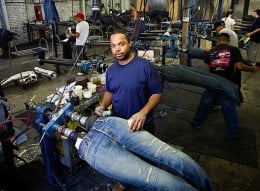If everything you bought certified US made was tax free would you buy it to hel
If everything you bought certified US made was tax free would you buy it to help the economy?
If the US government designated that all products manufactured in the US (subject to intense audits) were tax free would you buy it, even though it may still cost a little more to boost the economy and bring work back home?
Your question has complexities that would take about 10 Hubs to answer but, in general, the answer is..... maybe. In and of itself buying products made in the U.S. may or may not help the economy depending on the industry that benefits. For instance, if a Toyota car is made in the U.S. but the parent company, Toyota, is in Japan and the profits go to Japan...how much does that help the U.S economy? Would U.S. based corps be treated differently the non- U.S. corps?
What you are proposing is little more than a disguised tariff and other countries who don't put tariffs on our goods shipped to them would likely retaliate and cause what our U.S. manufacturers make to be taxed. So in your scenario some U.S. workers would win and some would lose. Who gets to pick the winners and losers?For clarification, I am all for buy American, but I'm not in favor of further manipulating/complicating the already bizarre tax code to try to accomplish it. Also sales tax is a State tax source, income tax is mostly a federal tax, more complications
What if it could be done as a rebate opposed to the no tax? I just think if there was something that could create more jobs that it would boost the economy. I mean look at car sales when they gave extra money for the old clunkers.
@charlu A rebate from whom? Government? That means you are asking taxpayers to fund this? Cash for clunkers had problems, electric car rebate bought a bunch of golf carts. If rebate goes to American products already being sold it would be zero gain.
@BuyaBiz Yes the rebate would be government funded. But if it boosted sales even on already retailed American made products increasing production and the need for more employees, wouldn't we save money on unemployment, work for welfare, etc ?
@Charlu - what about the products already being sold before the rebate. Let's say the U.S. company now sells 1,000 widgets but with rebate they sell 1,200 widgets. Is the rebate for all 1,200? Even though only 200 were incremental? When rebate ends?
@BuyaBiz Yes the rebate would be for all 1200 whereas it would be consumer based. Many rebates would probably never even be redeemed depending on the dollar amount and it would obviously be a promotional factor also. Success would determine the end
Hi Charlu,
I would definitely like to support our own workers who desperately need jobs and would pay a bit more to purchase things made in the USA. However with the caveat that no taxes would be paid on those purchases...that would hurt local and federal governments who need those taxes to help pay for schools, public transportation, filling potholes in the roads or even paving new roads, etc. They would then have to raise property taxes or get the money from some other source to make up for the shortfall.
Therefore if you would subtract the "tax free" part of your question...my answer would be a definite and resounding "yes!"
BuyaBiz makes some valid points...but even if the profits for the company went to another country because it was owned there...our workers would still get their salaries because they work here so it would be pumping much needed dollars into our workers paychecks which would help support their families. Again...kick out the tax free part of your question and I am sure that BuyaBiz would be on board with your question in the affirmative.
Bottom line is we NEED to help our U.S. workers by buying American made products!- JThomp42posted 13 years ago
0
Absolutely!! I try to buy American made anytime I can anyway. I would hope as proud Americans, Others do the same.
The economy needs to be fixed so that it does not run primarily on consumer spending. History has shown that all economies based this way eventually collapse because you cannot sustain a climbing pattern of consumption indefinitely.
I live next to a state that has no sales tax, and can go buy anything tax-free, but the tax-free situation doesn't make me shop more, it doesn't make more jobs and it's not boosting that state's economy overall.Not necessarily. The fact that something is made in the US is not always what it seems. The higher labor costs would be the equivalent of a pay decrease to the consumer. That is not a net always a net postive to the US economy. For example if the cost of desk you bought to furnish your office went from $2000 to $5000, the 3k difference is still 3k less that may get spent on some other form of consumption here in the US. That means you need to now work harder to make the extra 3k, or cut back 3k in spending elswhere. The fact is that the US has become a highly developed economy. We are not likely to be a major player in the area of manufacturing again anytime soon, if ever. We are more often the place were the new ideas in technology are developed, but much of the manual labor will be done in less developed places where wages are lower. If all of that labor was brought back here we'd have an inflationary problem for the consumer that can be quite problematic to the US economy. There is an important balance in the area of free trade. It is not a bad thing by any means. Unfortunately some of our trading partners like China don't always play by the rules of "Free" trade.
The tax aspect would mean retalitation by other nations on our exports. This was one of the fundamental policy mistakes made during the great depression. In reality since we don't use a VAT tax it would likely be less relevant anyway.
Related Discussions
- 34
How Important Is Made In America To You?
by Thomas Byers 12 years ago
How Important Is Made In America To You?Years ago before NAFTA and all the American textile jobs being sent over seas there were ongoing campaigns about, " Made In The USA". Now whole cities in the American south look like ghost towns because the jobs have been sent over seas and all the...
- 42
Buying American Made - A Social Issue?
by Ken Kline 14 years ago
Is buying "proudly made in USA" and proudly paying US taxes becoming a social concern to Americans?The economic crisis has shown Americans the importance of jobs and job growth. Has this crisis changed the buying habits of Americans?Do you actively seek out gasoline stations that...
- 10
Buy American - Activism or Not
by Ken Kline 14 years ago
My wife loves french make-up and silk scarves, I love Italian loafer and foreign cars. We try to buy right and have started to try to buy American. Do you care? Should we care? Is buying American activism or protectionism? Can we create American jobs IF we buy more...
- 42
Made In America!
by Angie B Williams 3 months ago
“We don’t want America’s future to be built with shoddy steel from Shanghai—we want it built with the strength and the pride of Pittsburgh!”- President Trump at U.S. Steel, Pittsburgh, P.A. in the good ole U.S. of A.A subject that every U.S. loving American can get behind; no matter party...
- 1
Some of Ethical & Eco-sustainable Furniture Brands & Companies
by Wooddyhome Simple Furniture 2 years ago
Some of Ethical & Eco-sustainable Furniture Brands & CompaniesEco-friendly furniture is a design trend for a sustainable meaningful life, existence, and gratitude to nature and creation by protecting the natural environment, using harmony and balance, favouring natural materials, can be...
- 152
Over 60% of Registered Voters Want All Illegal Immigrants Deported
by Readmikenow 3 months ago
CBS host shocked by poll showing 62% of registered voters support deporting all illegal immigrantsA CBS News/YouGov poll found that 62% of registered voters said they would support a government program that would deport all migrants living in the U.S. illegally. The poll, conducted between June...











